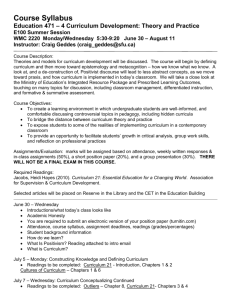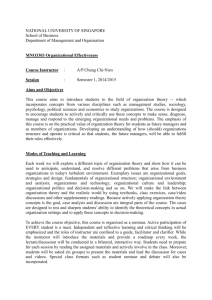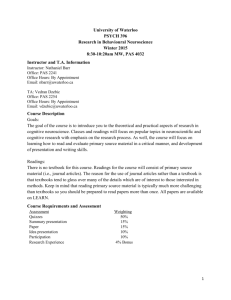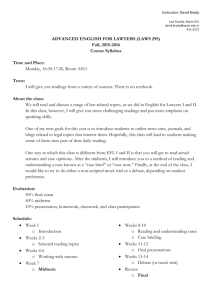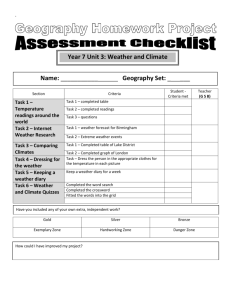Urban Dynamics: Global, Regional, and Local Connections
advertisement
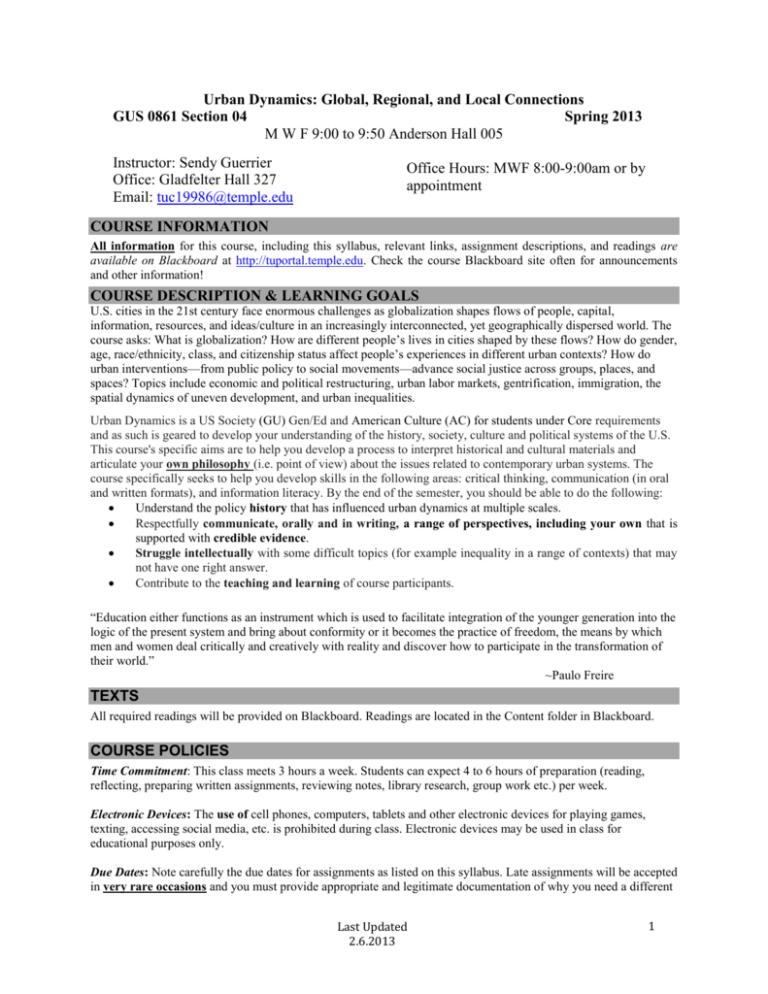
Urban Dynamics: Global, Regional, and Local Connections GUS 0861 Section 04 Spring 2013 M W F 9:00 to 9:50 Anderson Hall 005 Instructor: Sendy Guerrier Office: Gladfelter Hall 327 Email: tuc19986@temple.edu Office Hours: MWF 8:00-9:00am or by appointment COURSE INFORMATION All information for this course, including this syllabus, relevant links, assignment descriptions, and readings are available on Blackboard at http://tuportal.temple.edu. Check the course Blackboard site often for announcements and other information! COURSE DESCRIPTION & LEARNING GOALS U.S. cities in the 21st century face enormous challenges as globalization shapes flows of people, capital, information, resources, and ideas/culture in an increasingly interconnected, yet geographically dispersed world. The course asks: What is globalization? How are different people’s lives in cities shaped by these flows? How do gender, age, race/ethnicity, class, and citizenship status affect people’s experiences in different urban contexts? How do urban interventions—from public policy to social movements—advance social justice across groups, places, and spaces? Topics include economic and political restructuring, urban labor markets, gentrification, immigration, the spatial dynamics of uneven development, and urban inequalities. Urban Dynamics is a US Society (GU) Gen/Ed and American Culture (AC) for students under Core requirements and as such is geared to develop your understanding of the history, society, culture and political systems of the U.S. This course's specific aims are to help you develop a process to interpret historical and cultural materials and articulate your own philosophy (i.e. point of view) about the issues related to contemporary urban systems. The course specifically seeks to help you develop skills in the following areas: critical thinking, communication (in oral and written formats), and information literacy. By the end of the semester, you should be able to do the following: Understand the policy history that has influenced urban dynamics at multiple scales. Respectfully communicate, orally and in writing, a range of perspectives, including your own that is supported with credible evidence. Struggle intellectually with some difficult topics (for example inequality in a range of contexts) that may not have one right answer. Contribute to the teaching and learning of course participants. “Education either functions as an instrument which is used to facilitate integration of the younger generation into the logic of the present system and bring about conformity or it becomes the practice of freedom, the means by which men and women deal critically and creatively with reality and discover how to participate in the transformation of their world.” ~Paulo Freire TEXTS All required readings will be provided on Blackboard. Readings are located in the Content folder in Blackboard. COURSE POLICIES Time Commitment: This class meets 3 hours a week. Students can expect 4 to 6 hours of preparation (reading, reflecting, preparing written assignments, reviewing notes, library research, group work etc.) per week. Electronic Devices: The use of cell phones, computers, tablets and other electronic devices for playing games, texting, accessing social media, etc. is prohibited during class. Electronic devices may be used in class for educational purposes only. Due Dates: Note carefully the due dates for assignments as listed on this syllabus. Late assignments will be accepted in very rare occasions and you must provide appropriate and legitimate documentation of why you need a different Last Updated 2.6.2013 1 due date. These negotiations must occur before the assignment is due. If you are not in class for a surprise quiz, you cannot make up the points. Policy on Religious Holidays: If you will be observing any religious holidays this semester which will prevent you from attending a regularly scheduled class or interfere with fulfilling any course requirement, your instructor will offer you an opportunity to make up the class or course requirement if you make arrangements by informing your instructor of the dates of your religious holidays within two weeks of the beginning of the semester (or three days before any holidays which fall within the first two weeks of class). ASSIGNMENTS Participation: Class attendance is mandatory. Active participation is crucial to your learning in this course, and to be involved you must be present. The course material covered will require you to engage fully in class activities and discussions. Attendance will help in your understanding of the major concepts and themes covered throughout the semester. Surprise Quizzes: Class attendance is very important to the success of the class. Thus attendance and preparation for every class is mandatory. Attendance will be captured by 10 (2 points each) surprise quizzes throughout the semester. Quizzes could be given at the beginning, middle or end of the class. If you are not in class when the quiz is administered you will miss the opportunity to earn the points associated with that quiz. Collectively quizzes are 20 points of your grade. Topic Discussion Leaders: During weeks 4-14 of the semester, two to three students will work together to present their critical analysis of the weeks’ reading(s). There will be no more than 40 pages of text for any week. Each group is expected to spend time preparing to lead the class discussion during their assigned week. As a topic discussion leader, you are expected to include the following as part of your discussion of the material: What are the key argument(s) presented by the text(s)? What evidence is presented to support the argument(s)? Is this evidence credible? Why or Why not? How is the text(s) linked to the theme of urban inequality? Your group should also prepare 2 to 3 additional questions to facilitate classroom discussion. As a topic discussion leader, you are to engage your classmates on the elements of the text or topic that you find compelling or thought provoking. No outside research is required for this assignment. Topic discussion leaders are not required to prepare any written materials. Each member of the group is expected to make significant equitable contributions to prepare to be topic discussion leaders. This assignment is worth 20 points. All other students are expected to come to class having read the assigned material and to actively participate in the discussion. Midterm: The midterm is a take home essay of 3 to 5 pages due during the 7th week of class (March 8th). It is worth 20 points. Students will get a choice of questions to answer but all of the questions will ask you to critically analyze some element of the topics/readings discussed during the first six weeks of the semester. References to classroom discussions (including those led by fellow students), in class activities, and documentaries can all be used in preparing this essay. No outside research is required for this assignment. The essay questions will be distributed at least one week before the due date. The midterm will be turned in electronically via Blackboard. Essays should include appropriate in-text citations and a bibliography. Final Paper Project (Bibliography, Outline and Paper): The fourth component of your grade will be a research paper project. Each student will pick a city in the United States and write a 5 to 7 page paper about that city. In this paper, you are expected to present an argument, evidence to support that argument, and develop some conclusions. The paper should focus on one of the topics/issues discussed during weeks 4 to 14 of the semester. Your task will be Last Updated 2.6.2013 2 to collect specific information about that issue in your chosen U.S. city, describe it in detail and analyze it based on the framework, issues, and information we have discussed in class. Some questions you may want to consider in your paper: What are the attributes of the city (economic, social, political, etc) that contribute to or precipitate this issue? How is this issue related to urban inequality? How are citizens, nonprofit organizations and/or governance structures responding to the issue? This paper should be the result of extensive library research and use of peer reviewed academic sources or legitimate electronic resources. Please note that New York Times, Fox News, travel guides, BBC, and Wikipedia to name a few do not count as academic sources. To assist you in successfully completing this project, you will turn in three components electronically via Blackboard: 1. 2. 3. A properly formatted 1 preliminary bibliography of at least 10 sources is due on February 12th by 11:59 PM and is worth 10 points. An outline of your paper is due on April 5th by 11:59 PM and is worth 10 points. The final paper is due on May 6th by 11:59 PM and is worth 20 points. The final paper format should be double-spaced, one inch margin all around, font size 12, have in-text-cites and a bibliography using APA style guide (papers without in-text cites and bibliographies will receive 0 points) and well written. To make sure your papers are well written, go to the writing center well before the paper is due with a draft of your paper. There will be a rubric posted on Blackboard explaining how papers will be evaluated. LATE PAPERS WILL NOT BE ACCEPTED!!! Learning Goals Assessments Understand the policy history that has influenced urban dynamics at multiple scales. Respectfully communicate, orally and in writing, a distinct point of view that is supported with credible evidence. Struggle intellectually with some difficult topics (for example, inequality in a range of contexts) that may not have one right answer. Contribute to the teaching and learning of course participants. Assignments Surprise Quizzes Topic Discussion Leaders (Group Project) Midterm (3-5 page paper) Final Paper Project Bibliography Outline Final Paper (5-8 pages) Topic Discussion Leader Surprise Quizzes Final paper project (bibliography, outline, final paper) Classroom discussion participation Topic Discussion Leader Short paper (Midterm) Surprise Quizzes Class Discussions Final Paper Project Class Discussion Leader Classroom discussion participation Point Value 20points 20points 20points Due Date Ongoing Ongoing March 8TH 10points 10points 20points February 15th April 5th May 6th 1 Students are expected to use the format of APA style (American Psychological Association) 6th edition for bibliography and all in text citations. Resources will be provided regarding APA formatting. Last Updated 2.6.2013 3 GRADING SCALE Final grades are based on the following point system: 92 - 100 = A 80 - 81 = B90 - 91 = A78 - 79 = C+ 88 - 89 = B+ 72 - 77 = C 82 - 87 = B 70 - 71 = C- 68 – 69 = D 67 or less = F The number of points you earn by the end of the semester is the grade you will be assigned. I strongly encourage you to seek assistance early and often if you are having any problems in the course. CLASSROOM ENVIRONMENT & STUDENT RIGHTS All persons participating in the course should be respectful of other students and the instructor in order to facilitate a civil and supportive learning environment. All persons participating in the course have a right to expect respectful treatment in the classroom. This course is open to all students who met the academic requirements for participation. Any student who has a need for accommodation based on the impact of a disability should contact the instructor privately to discuss the specific situation as soon as possible. Contact Disability Resources and Services at 215-204-1280 to coordinate reasonable accommodations for students with documented disabilities. Freedom to teach and freedom to learn are inseparable facets of academic freedom. The University has adopted a policy on Student and Faculty Academic Rights and Responsibilities (Policy # 03.70.02) which can be accessed through the following link: http://policies.temple.edu/getdoc.asp?policy_no=03.70.02 ACADEMIC INTEGRITY Students should maintain academic honesty at all times. Students should keep in mind that cheating, fabrication of academic material and plagiarism are serious offenses, and will not be tolerated in any way, shape or form. Students should do their own work, and GUS Departmental policy is consistent with the University's policy. Any proven incident of plagiarism or dishonesty in any class assignment will result in an immediate course failure as well as the student being referred to the Director of Academic Administration. See also: Student and Faculty Academic Rights and Responsibilities (Policy # 03.70.02), which can be accessed through the following link: http://policies.temple.edu/getdoc.asp?policy_no=03.70. WEEKLY OUTLINE (subject to revision) Week 1: Setting the Stage Wednesday 1/23: Class Overview Friday 1/25: Reading Due (Topic Discussion Leader:) Anti-Essentialism and Intersectionality: Tools to Dismantle the Master’s House by Trina Grillo (1995) Berkeley Women’s Law Journal, Vol 16 read pages 16 to the top of 22 Week 2: Globalization Monday 1/ 28: In class activity/discussion; sign up for Topic Discussion Assignments Wednesday1/30: Fundamentals of Library Research (Special Guest: Mr. Gregory McKinney, Research and Instructional Services) Friday 2/1: Readings Due (Topic Discussion Leader:) Steger, M. (2003). Globalization: A Contested Concept. In M. Steger, Globalization: A very short introduction (pp.1-16). Oxford: Oxford University Press. Wilson, D. (1997). Preface. Annals of the American Academy of Political and Social Science, 551, Globalization and the Changing U. S. City, 8-16. Last Updated 2.6.2013 4 Week 3: Shifts in U.S. Economy Monday 2/4: Readings Due (Topic Discussion Leader:) Adams, C., Barlett, D., Elesh, D., Goldstein, I., Kleniewski, N., Yancey, et al. (1991). Economic Erosion and the Growth of Inequality. In C. Adams et. al, Philadelphia: Neighborhoods, Division and Conflict in a Postindustrial City (pp.30-65). Philadelphia: Temple University Press. Wednesday 2/6: In class activity/discussion Friday 2/8: In class activity/discussion Week 4: Contemporary Urbanization Monday 2/11: Readings due (Topic Discussion Leaders: )** Wyly, E. K.; Glickman, N. J.; Lahr, M. L. (1998). A Top 10 List of Things to Know About American Cities. Cityscape. 3(3). 7-32. Fink, M. (1993). Toward a Sunbelt urban design manifesto. Journal of the American Planning Association, 59(3), 320-323. Wednesday 2/13: Prepare Bibliography (in Paley Library) Friday 2/15: In class activity/discussion; Bibliography Due at 11:59 pm via Blackboard Week 5: Internal Structure of US Cities/Spatial Stratification Monday 2/18: Readings Due (Topic Discussion Leaders:) Alstshuler, A.; Morrill, W., Wolman, H., Mitchell, F. (1999). Central Cities, Suburbs, and Metropolitan-Area Problems. In A. Alstshuler (Ed). Governance and Opportunity in Metropolitan America (pp. 22-39). Washington, D.C.: National Academy Press Beauregard, R. A. (2001). Federal Policy and Postwar Urban Decline: A Case of Government Complicity?. Housing Policy Debate, 12(1), 129-151 Wednesday 2/20: In class activity/discussion Friday 2/22: In class activity/discussion Week 6: Urban Renewal & Redevelopment Monday 2/25: Readings Due (Topic Discussion Leaders:) Adams, C., Barlett, D., Elesh, D., Goldstein, I., Kleniewski, N., Yancey, et al. (1991). Philadelphia’s Redevelopment Process. In C. Adams et. al, Philadelphia: Neighborhoods, Division and Conflict in a Postindustrial City (pp.100-123). Philadelphia: Temple University Press. Porter, M. E. (1997). New Strategies for Inner-City Economic Development. Economic Development Quarterly, 11(1), 11–27. Wednesday 2/27: In class activity/discussion Friday 3/1: In class activity/discussion Week 7: Gentrification Monday 3/4: Readings Due (Topic Discussion Leaders:)** Slater, T. (2006). The Eviction of Critical Perspectives from Gentrification Research. International Journal of Urban and Regional Research, 30(4), 737–757. Byrne, J. P. (2003). Two Cheers for Gentrification. Howard Law Journal, 46, 1–12. Wednesday 3/6: In class activity/discussion Friday 3/8: Prepare Midterm Essay (in Paley Library); Midterm Essay due by 11:59pm via Blackboard MARCH 9-17: SPRING BREAK- NO CLASSES Last Updated 2.6.2013 5 Week 8: Urban Labor Markets Monday 3/18: In class activity/discussion Wednesday 3/20: Readings Due (Topic Discussion Leaders:) Ranney, D. (2003). Manufacturing Collapses in Chicago. In D. Ranney, Global Decisions, Local Collisions: Urban Life in the New World Order, (pp. 71-90). Philadelphia: Temple University Press. Sklar, H. (1995). Breakdown of the Paycheck. In H. Sklar, Chaos or Community? Seeking Solutions, Not Scapegoats for Bad Economics (pp.17-34). Boston, MA: South End Press. Friday 3/22: In class activity/discussion Week 9: Urban Workers in a Global Economy Monday 3/25: Readings Due (Topic Discussion Leaders:) Feiner, S. (1994). Three Economic Paradigms: The Conservative/Free Market, the Liberal/Imperfectionist, and the Radical/Exploitation Schools. In S. Feiner (Ed), Race & Gender in the American Economy (pp.22-27). Englewood Cliffs, NJ: Prentice Hall. Becker, G. (1994). Contrary to Popular Belief, The Economic Boom Did Trickle Down. In S. Feiner (Ed), Race & Gender in the American Economy (pp.37-38). Englewood Cliffs, NJ: Prentice Hall. O’brien, R. T. (2006). Unemployment and disposable workers in Philadelphia: Just how far have the bastards gone? Ethnos, 71(2), 165–190. Wednesday 3/27: In class activity/discussion Friday 3/29: In class activity/discussion; Week 10: Immigration Monday 4/1: Readings Due (Topic Discussion Leaders:)** Ciscel, D. H., Smith, B. E., & Mendoza, M. (2003). Ghosts in the Global Machine : New Immigrants and the Redefinition of Work. Journal of Economic Issues, 37(2), 333–341. Iskander, B. N., & Lowe, N. (2012). The Politics of Skill: Rethinking the Value of “Low Skilled” Immigrant Workers (pp. 1–6). Washington, DC: Immigration Policy Center. Laws, G. (1997). Globalization, Immigration, and Changing Social Relations in U. S. Cities. American Academy of Political and Social Science, 551, 89–104. Wednesday 4/3: Prepare Outline (in Paley Library) Friday 4/5: In class activity/discussion; Outline of Final Paper due at 11:59pm via Blackboard Week 11: Poverty in U.S. Cities I Monday 4/8: Readings Due (Topic Discussion Leaders:) Katz, M. (2001). Poverty and Inequality in the New American City. In M. Katz, The Price of Citizenship: Redefining the American Welfare State (pp. 33-56). New York, NY: Henry Holt and Company. Nightingale, D. S., & Fix, M. (2004). Economic and Labor Market Trends. The Future of Children, 14(2), 49–59. Wednesday 4/10: In class activity/discussion Friday 4/12: In class activity/discussion Week 12: Poverty in U.S. Cities II Monday 4/15: Readings Due (Topic Discussion Leaders:) Abramovitz, M. (2006). Welfare Reform in the United States: gender, race and class matter. Critical Social Policy, 26(2), 336–364. Murray, L. (2000). The New Politics of the New Poverty. In C. Pierson & F. Castles (Ed), The Welfare State Reader (pp.107-115). Englewood Cliffs, NJ: Prentice Hall. Wednesday 4/17: In class activity/discussion Friday 4/19: In class activity/discussion Last Updated 2.6.2013 6 Week 13: Contemporary Urban Social Movements I Monday 4/22: Readings Due (Topic Discussion Leaders:) Weinbam, E. (2001). From Plant Closing to Political Movement: Challenging the Logic of Economic Destruction in Tennessee. In J. Gode & J. Maskovsky (Eds). The New Poverty Studies: The Ethnography of Power, Politics and Impoverished People in the United States (pp. 399-431). Washington, D.C.: National Academy Press Wednesday 4/24: In class activity/discussion Friday 4/26: In class activity/discussion Week 14: Contemporary Urban Social Movements II Monday 4/29: Readings Due (Topic Discussion Leaders:) Silver, H., Scott, A., & Kazepov, Y. (2010). Participation in Urban Contention and Deliberation. International Journal of Urban and Regional Research, 34(3), 453–477. doi:10.1111/j.14682427.2010.00963.x Hardt, M., & Negri, A. (2011). The Fight for ‘Real Democracy ' at the Heart of Occupy Wall Street. Foreign Affairs, 14–16. Tarrow, S. (2011). Why Occupy Wall Street is Not the Tea Party of the Left. Foreign Affairs, 8–10. Wednesday 5/1: Final Paper Consultations (in Paley Library) Friday 5/3: In class activity/discussion Week 15: Wrapping Up Monday 5/6: In class activity/discussion; Final Paper due at 11:59pm via Blackboard ** Students who are topic discussion leaders during the weeks when there are other major assignments due will get an extension on the due date of their written assignment. Students who take these dates will have the option to turn in their bibliography, outline, and midterm the Monday following the due date by 11:59pm. This extension applies only to the topic discussion leaders of the weeks in which the bibliography, midterm and outline are due. Last Updated 2.6.2013 7

